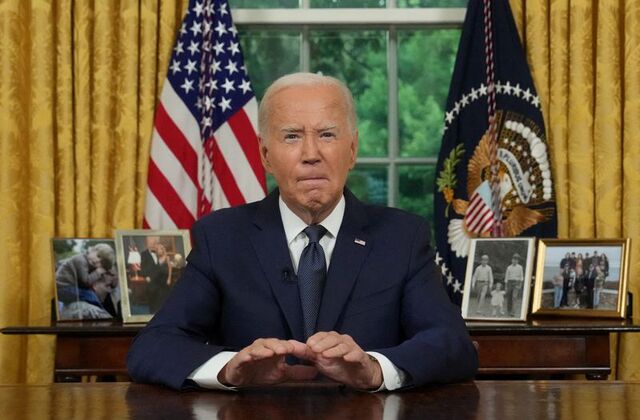As the summer season progresses, the markets are already facing numerous obstacles, such as evaluating the possibility of rate reduction by the Federal Reserve and managing the peak of results season. The financial situation has become even more convoluted, though, as the 2024 presidential election has drawn more and more attention. As political changes continue, investors have been modifying their tactics to account for the increased uncertainty brought on by current events.
There have been tremors in the financial markets following President Joe Biden’s announcement that he will not run for office again. Biden has backed Vice President Kamala Harris to be the Democratic nominee in the face of intense criticism and growing skepticism about his candidacy. A string of dramatic events, including an attempt on the life of Republican nominee Donald Trump, preceded this decision, which is made at a critical juncture, fewer than four months before the November election.
This political turmoil is poised to introduce considerable volatility into the markets, at least in the short term. The so-called “Trump Trade,” which has been favorable for certain sectors like energy companies, banks, and Bitcoin, while less beneficial for electric vehicles and renewables, may face disruptions. The Trump Trade gained momentum following Biden’s underwhelming debate performance, but Biden’s withdrawal has left investors questioning the future trajectory of this strategy.
The market’s reaction to these political developments is already evident. Wayne Kaufman, Chief Market Analyst at Phoenix Financial Services, expressed concern about the historical nature of the current market environment. Kaufman noted that just a week ago, his team was discussing the implications of the assassination attempt on Trump. He questioned whether the “buy the dip” mentality would persist amid the new uncertainties, pointing out that market valuations have been a persistent issue. Despite the support provided by optimism around artificial intelligence, the market faces challenges, particularly as it heads into August and September, historically weaker months.
Julie Biel, Portfolio Manager and Chief Market Strategist at Kayne Anderson Rudnick, highlighted the heightened uncertainty following Biden’s announcement. She emphasized that there is little precedent for a situation involving a candidate who did not undergo the traditional primary process. Biel remarked on the ongoing nature of these “unprecedented times” and the substantial uncertainty that investors now face. Although investors might be accustomed to navigating a landscape where business as usual is increasingly rare, the current political developments present a significant amount of unpredictability.
Matt Maley, Chief Market Strategist at Miller Tabak + Co., predicted that trades associated with Trump, such as those involving Bitcoin and energy, might begin to unwind. Conversely, sectors that had been adversely affected, such as solar stocks and electric vehicles, could experience a rebound. Maley emphasized that the market is still navigating considerable uncertainty, which typically leads to volatility. He anticipated a notable increase in market volatility between now and Labor Day, continuing through September.
Yung-Yu Ma, Chief Investment Officer at BMO Wealth Management, suggested that the Trump trade would likely pause until there is more clarity on the Democratic nominee. Ma noted that Biden’s decision adds another layer of political uncertainty to the markets, which is expected to result in near-term market fluctuations. Investors will need to monitor the evolving political landscape closely and adjust their strategies accordingly.
Early Asian trade was comparatively muted following Biden’s announcement, suggesting that investors are taking a wait-and-see stance. Although Bitcoin stayed at $68,000 and equity futures barely moved, the dollar suffered a small decrease compared to its major counterparts. An indication of a slight reversal of the so-called curve steepener trade, which had been linked to a Trump victory, was seen in the Treasury market, as US longer-maturity bond futures increased more than their shorter-dated equivalents.
Navigating a market increasingly impacted by political unpredictability presents a challenge for investors as they take in the most recent news. A number of obstacles are expected to arise for the Trump trade, which has benefited industries that gain from the Republican’s positions on trade tariffs, fiscal policy, and regulatory reform. The rush of second-quarter earnings reports and the continuing debates over when the Federal Reserve would start lowering interest rates are also causing market disruptions for investors to deal with.
Moving forward, the emphasis will be on how Kamala Harris will steer the Democratic campaign. It will be carefully examined how Harris’s proposals and campaign tactics might affect different industries. Investors must evaluate whether Harris would carry on Biden’s ideas or launch fresh measures that might change the way the market operates. By the time the election gets closer, this additional layer of uncertainty will make markets nervous.
Unexpected political developments have added a great deal of uncertainty to a market climate that was already complicated. With Biden dropping out of the race and Harris receiving the endorsement of the Democratic Party, investors now have to negotiate a changing political landscape. There may be ramifications for different market sectors and investing methods, therefore the effects of these developments will be keenly watched. An increasing number of investors will need to be on the lookout for fresh information and changes, so they will need to be flexible and alert as the election gets closer. The financial environment will continue to be shaped in the upcoming months by the interaction between political developments and market reactions.
If you like the article please follow on THE UBJ.
